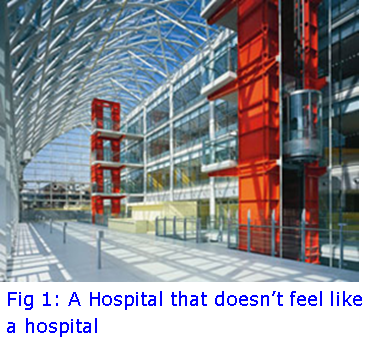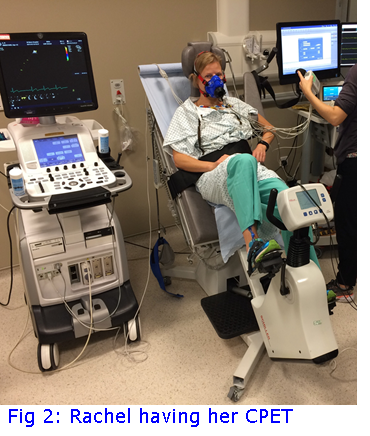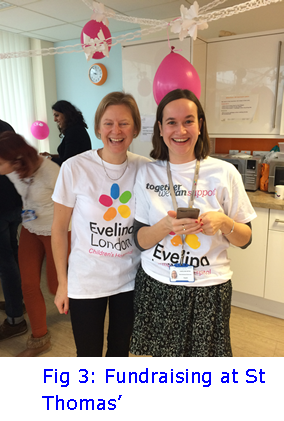Fundraising For The Evelina London Children’s Hospital
Evelina London Children's Healthcare is part of Guy's and St Thomas' NHS Foundation Trust and is one of only two specialist children's hospitals in London.
The hospital’s neonatal unit cares for around 900 babies a year, and has some of the best survival rates in the UK. The hospital has cared for over 55,000 young patients in the last year, providing around one in five of the UK’s kidney transplants in children. It is the UK’s leading hospital for paediatric heart services, and also specialises in kidney transplants, dialysis and neurology. Its mission is to provide world-leading treatment and care for each child and every family. Because Evelina London is on the same site as St Thomas’ Hospital, which is for adult care, there is a seamless transition in treatment for children with on-going illness.
Based in a stunning purpose-built building at St Thomas', the hospital includes:
- 141 inpatient beds, including 20 intensive care beds
- 52-cot neonatal unit
- 5 operating theatres, plus 1 cardiac theatre in East Wing, St Thomas'
- a full children's imaging service with MRI scanner, x-ray and ultrasound
- a kidney dialysis unit
- an outpatients department and a medical day care unit
- a hospital school
With themed floors, a conservatory, rooms with views, sunlight and fresh air, the Evelina London Children's Hospital was designed around the needs of children and their families.
It's a seven-storey glass-fronted building, featuring a four-storey conservatory and dramatic views of Lambeth Palace and Archbishop’s Park. Inpatients are on the upper levels of the building, so children staying in hospital enjoy the best views. They also overlook the conservatory, the social heart of the building, housing a gallery and performance space and the hospital school.
Pathology services for the Evelina London Children’s Hospital are provided by Viapath and two of Viapath’s laboratories, the Inherited Metabolic Disease laboratory and the Newborn Screening laboratory, work particularly closely with the Evelina. The Evelina provides the regional Inherited Metabolic Disease (IMD) service for south Thames covering south London, Kent, Sussex, Surrey and beyond, with outreach clinics as far as Plymouth, Cambridge and Norwich. More than 300 new patients are seen each year, with over 200 admissions to the ward. Evelina is one of the main IMD centres in the UK offering treatment to patients with all types of IMD, including procedures for diagnosis and acute and long-term management. Together with the Paediatric Metabolic Consultants, Clinical Nurse Specialists and Metabolic Dieticians the laboratory staff are a key part of the Metabolic Multi Disciplinary Team.
Rachel Carling, Viapath’s Consultant Metabolic Biochemist and Director of Newborn Screening, has been working hard to fundraise for the Evelina London Children’s Hospital and has already raised over £3600
Rachel’s next challenge is to run the London Marathon.
Rachel’s Story
#RunRachelRun: My campaign to raise money for Evelina London Children’s Hospital
On April 23rd 2017 I will be running the London Marathon. A subtle but definite emphasis should be placed on ‘running’ because my goal is to do exactly that: keep running. As with any challenge my approach is to tackle this head on and with just a few weeks to go until the big day, I have thrown myself into both fundraising and training. It is fair to say that one is considerably harder than the other and there is probably no need to mention that heart sink feeling I got when I realised the distances on my training plan were in miles not kilometres...
#RunRachelRun is my campaign to raise money for the Evelina London Children’s Hospital. As a Consultant Metabolic Biochemist and Director of Newborn Screening, I have worked closely with the Paediatric Metabolic Team at Evelina London for the last 8 years so this charity is close to my heart.
 Like any good scientist, I do like a nice experiment so to kick start my training plan I registered myself as a subject in the Barts Heart Centre Training Induced Spongy Heart Muscle Study. I have had an ECG, ECHO, cardio pulmonary exercise test (CPET) and MRI of my heart & knees. These tests will be repeated after 17 weeks of training and then again, 3 months after ‘detraining’. Initially I received a clean bill of health and I am now keen to see whether my knees will survive and my CPET data will improve ( ‘41’ and 150% being the baseline numbers).
Like any good scientist, I do like a nice experiment so to kick start my training plan I registered myself as a subject in the Barts Heart Centre Training Induced Spongy Heart Muscle Study. I have had an ECG, ECHO, cardio pulmonary exercise test (CPET) and MRI of my heart & knees. These tests will be repeated after 17 weeks of training and then again, 3 months after ‘detraining’. Initially I received a clean bill of health and I am now keen to see whether my knees will survive and my CPET data will improve ( ‘41’ and 150% being the baseline numbers).
In addition to the training, I have also been scheming up fundraising initiatives. These include street collections at Christmas Fair’s, two Boot Camps, a non uniform day & cake sale at my daughter’s school and of course the great Viapath Christmas Raffle, Jumper Day and Biochemical Sciences Bake Off. The support from everyone at Viapath has been brilliant and I am touched and very grateful, in particular to Kieran Voong who charmed a brass band into donating their Christmas Eve collection to the #RunRachelRun campaign.

The actual running business takes up a surprising amount of time. When I am not out training, I am reading about nutrition and shewees, complaining about interval training, debating the pros and cons of protein shakes and sports gels, contemplating whether adding Epsom salts to my bath water really is a good idea, buying new running kit and studying my Garmin run data. The latter clearly being the thing I look forward to most after my weekly long run; time, distance, pace, splits, calories, heart rate, cadence, elevation and GPS route. You name it, I look at it. Having only ever completed a half marathon prior to this, provided all goes to plan I realised that between now and 23rd April I should be clocking up a PB for distance run on a weekly basis. This gives me a small smile each time. So far I am up to 16 miles so I just need to add another 10.2 miles. I am convinced it is just like learning to annotate an organic acid chromatogram. At first it seems completely impossible, and a single chromatogram takes you a whole day to interpret. Over time you gradually build up to a batch a day and before you know it, you find that you love organic acids so much that you collect car registration number plates that feature their three letter abbreviations.
To read more about Rachel’s fundraising efforts or make a donation, click here

